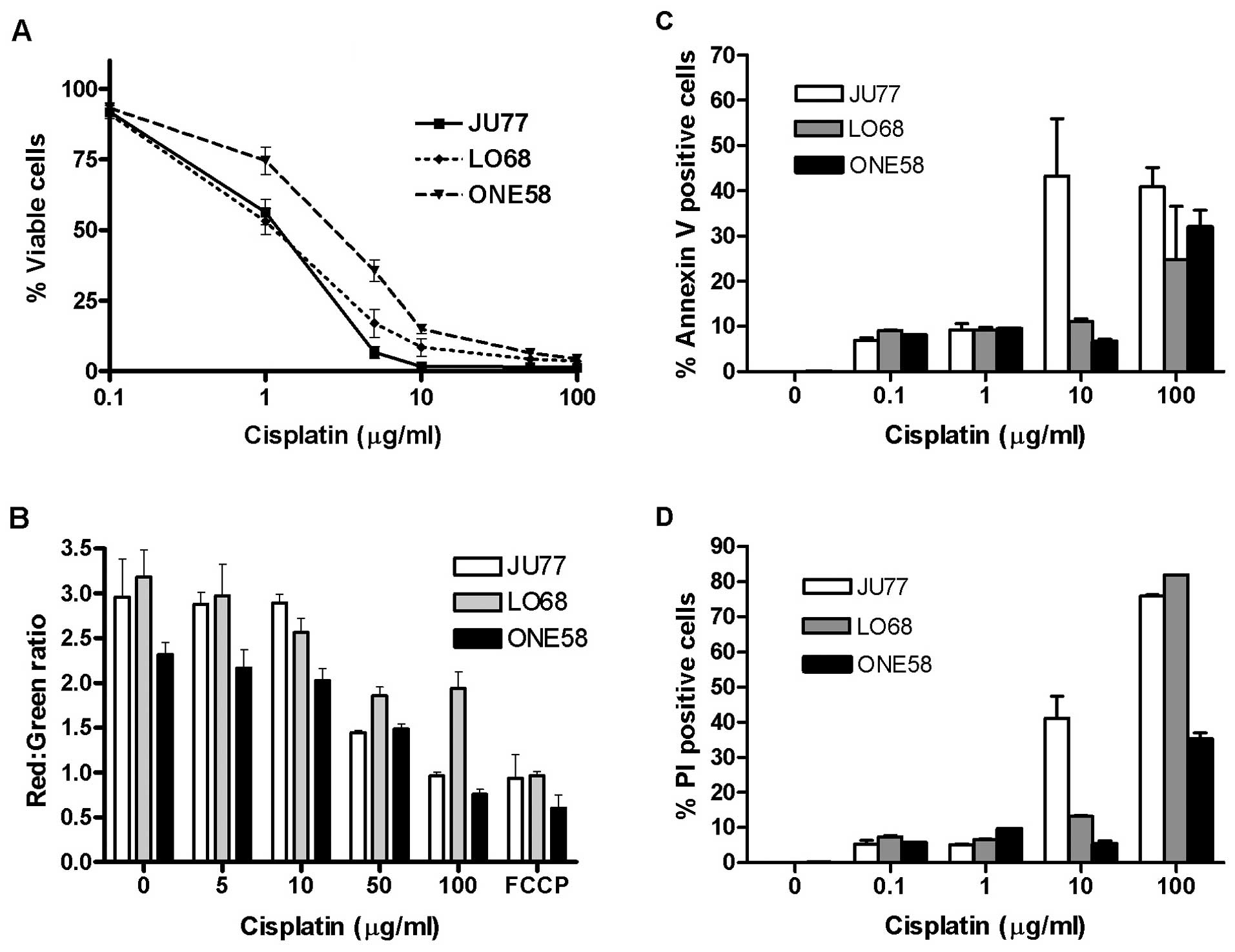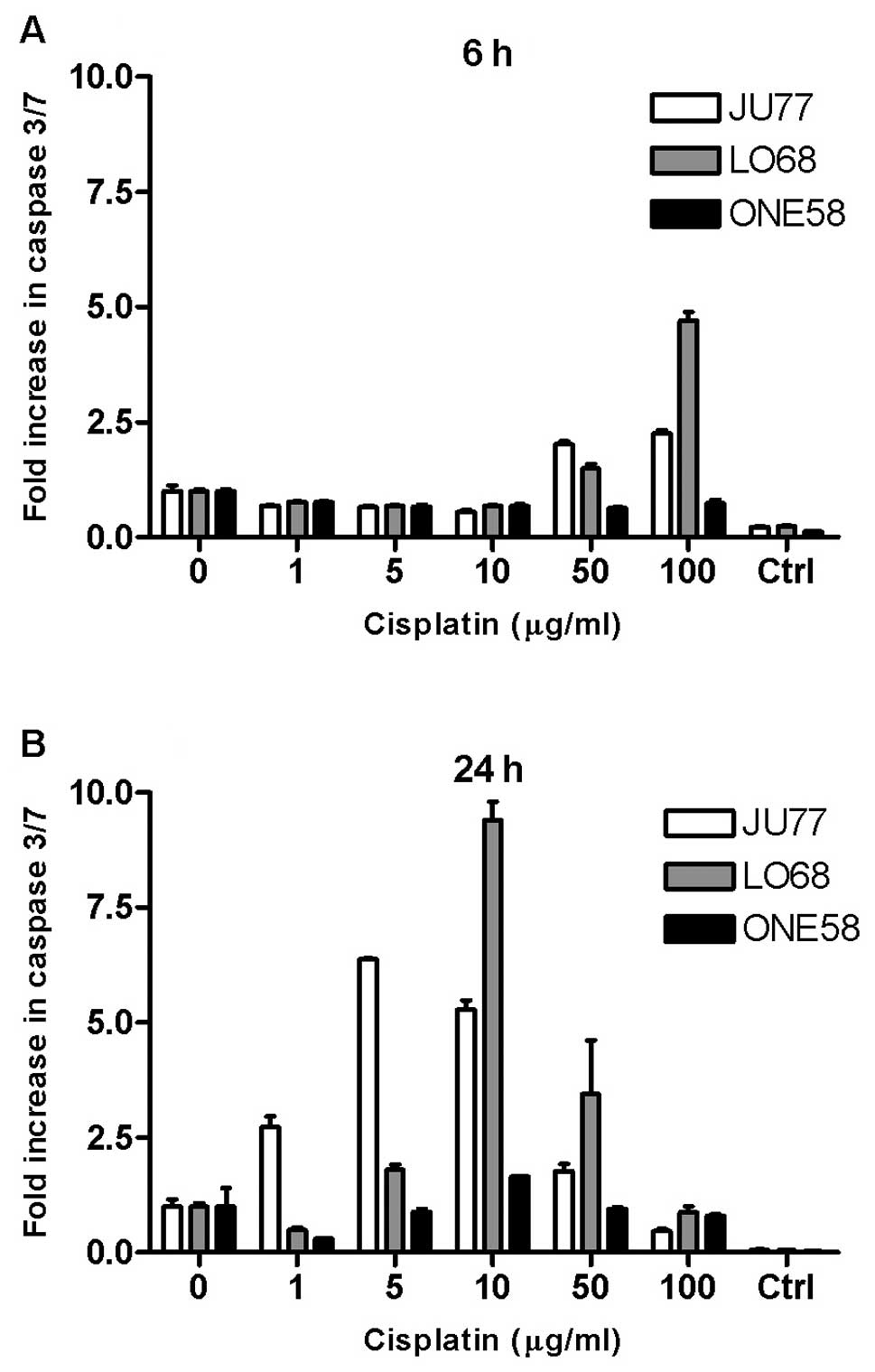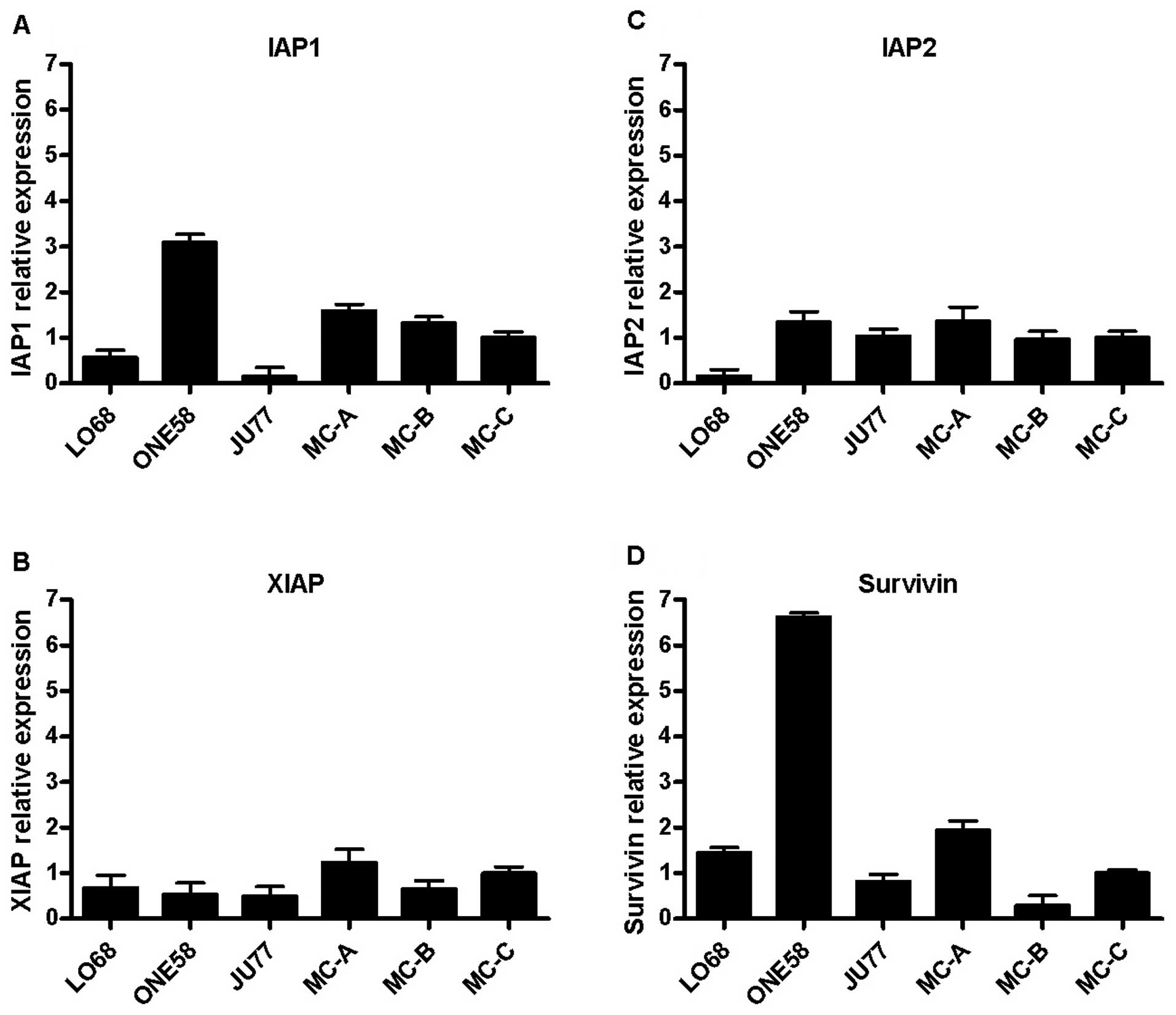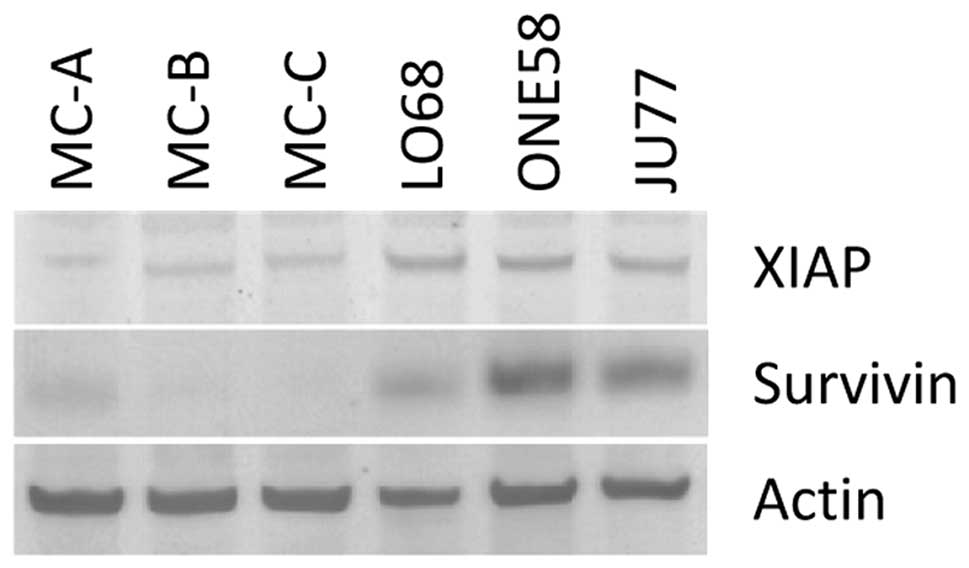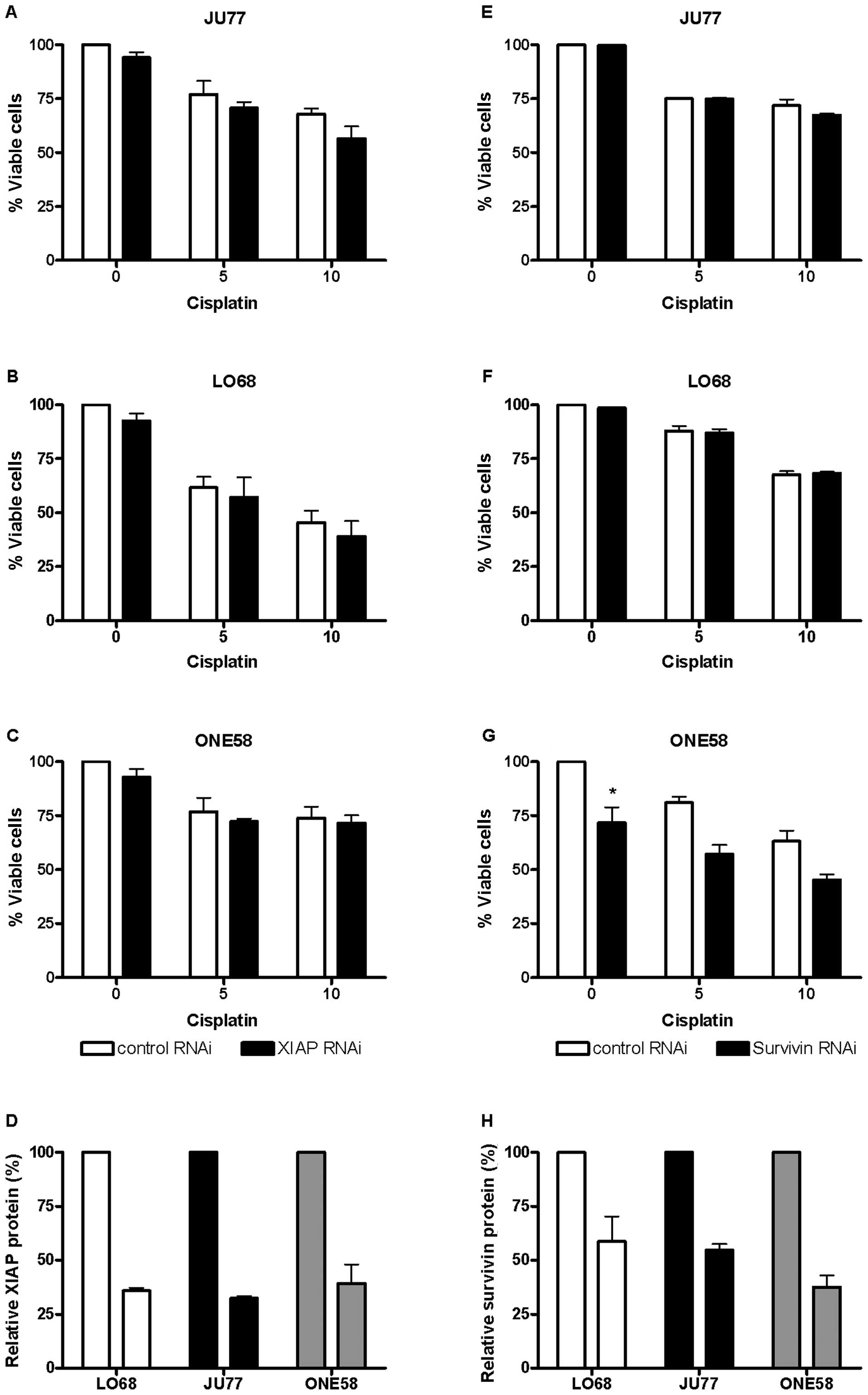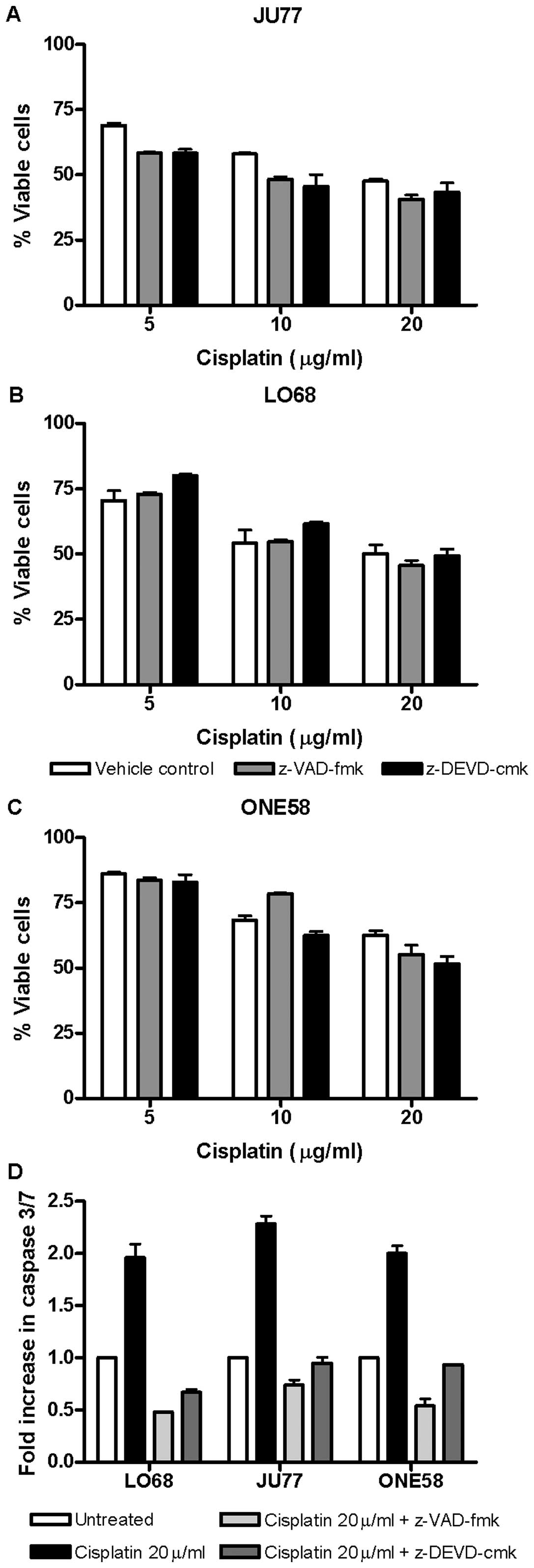|
1.
|
Spugnini EP, Bosari S, Citro G, Lorenzon
I, Cognetti F and Baldi A: Human malignant mesothelioma: molecular
mechanisms of pathogenesis and progression. Int J Biochem Cell
Biol. 38:2000–2004. 2006. View Article : Google Scholar : PubMed/NCBI
|
|
2.
|
Ray M and Kindler HL: Malignant pleural
mesothelioma: an update on biomarkers and treatment. Chest.
136:888–896. 2009. View Article : Google Scholar : PubMed/NCBI
|
|
3.
|
Rabik CA and Dolan ME: Molecular
mechanisms of resistance and toxicity associated with platinating
agents. Cancer Treat Rev. 33:9–23. 2007. View Article : Google Scholar : PubMed/NCBI
|
|
4.
|
Koberle B, Tomicic MT, Usanova S and Kaina
B: Cisplatin resistance: preclinical findings and clinical
implications. Biochim Biophys Acta. 1806:172–182. 2010.PubMed/NCBI
|
|
5.
|
Davidson B: Expression of
cancer-associated molecules in malignant mesothelioma. Biomark
Insights. 2:173–184. 2007.PubMed/NCBI
|
|
6.
|
Kleinberg L, Lie AK, Florenes VA, Nesland
JM and Davidson B: Expression of inhibitor-of-apoptosis protein
family members in malignant mesothelioma. Hum Pathol. 38:986–994.
2007. View Article : Google Scholar : PubMed/NCBI
|
|
7.
|
Zaffaroni N, Costa A, Pennati M, et al:
Survivin is highly expressed and promotes cell survival in
malignant peritoneal mesothelioma. Cell Oncol. 29:453–466.
2007.PubMed/NCBI
|
|
8.
|
Fox SA, Kusmiaty, Loh SS, Dharmarajan AM
and Garlepp MJ: Cisplatin and TNF-alpha downregulate transcription
of Bcl-xL in murine malignant mesothelioma cells. Biochem Biophys
Res Commun. 337:983–991. 2005. View Article : Google Scholar : PubMed/NCBI
|
|
9.
|
Manning LS, Whitaker D, Murch AR, et al:
Establishment and characterization of five human malignant
mesothelioma cell lines derived from pleural effusions. Int J
Cancer. 47:285–290. 1991. View Article : Google Scholar : PubMed/NCBI
|
|
10.
|
Altieri DC: Survivin and IAP proteins in
cell-death mechanisms. Biochem J. 430:199–205. 2010. View Article : Google Scholar : PubMed/NCBI
|
|
11.
|
Rozen S and Skaletsky H: Primer3 on the
WWW for general users and for biologist programmers. Methods Mol
Biol. 132:365–386. 2000.PubMed/NCBI
|
|
12.
|
Vandesompele J, De Preter K, Pattyn F, et
al: Accurate normalization of real-time quantitative RT-PCR data by
geometric averaging of multiple internal control genes. Genome
Biol. 3:Research 0034. 2002. View Article : Google Scholar : PubMed/NCBI
|
|
13.
|
Matsumiya T, Imaizumi T, Yoshida H, Kimura
H and Satoh K: Cisplatin inhibits the expression of
X-chromosome-linked inhibitor of apoptosis protein in an oral
carcinoma cell line. Oral Oncol. 37:296–300. 2001. View Article : Google Scholar : PubMed/NCBI
|
|
14.
|
Nomura T, Mimata H, Yamasaki M and Nomura
Y: Cisplatin inhibits the expression of X-linked inhibitor of
apoptosis protein in human LNCaP cells. Urol Oncol. 22:453–460.
2004. View Article : Google Scholar : PubMed/NCBI
|
|
15.
|
Siddik ZH: Cisplatin: mode of cytotoxic
action and molecular basis of resistance. Oncogene. 22:7265–7279.
2003. View Article : Google Scholar : PubMed/NCBI
|
|
16.
|
Andjilani M, Droz JP, Benahmed M and
Tabone E: Down-regulation of FAK and IAPs by laminin during
cisplatin-induced apoptosis in testicular germ cell tumors. Int J
Oncol. 28:535–542. 2006.PubMed/NCBI
|
|
17.
|
Golovine K, Makhov P, Uzzo RG, et al:
Cadmium down-regulates expression of XIAP at the
post-transcriptional level in prostate cancer cells through an
NF-kappaB-independent, proteasome-mediated mechanism. Mol Cancer.
9:1832010. View Article : Google Scholar
|
|
18.
|
Zhao J, Tenev T, Martins LM, Downward J
and Lemoine NR: The ubiquitin-proteasome pathway regulates survivin
degradation in a cell cycle-dependent manner. J Cell Sci. 113(Pt
23): 4363–4371. 2000.PubMed/NCBI
|
|
19.
|
Altieri DC: New wirings in the survivin
networks. Oncogene. 27:6276–6284. 2008. View Article : Google Scholar : PubMed/NCBI
|
|
20.
|
Holcik M: Translational upregulation of
the X-linked inhibitor of apoptosis. Ann N Y Acad Sci.
1010:249–258. 2003. View Article : Google Scholar : PubMed/NCBI
|
|
21.
|
Li Y, Jian Z, Xia K, et al: XIAP is
related to the chemoresistance and inhibited its expression by RNA
interference sensitize pancreatic carcinoma cells to
chemotherapeutics. Pancreas. 32:288–296. 2006. View Article : Google Scholar : PubMed/NCBI
|
|
22.
|
Zhang Y, Wang Y, Gao W, et al: Transfer of
siRNA against XIAP induces apoptosis and reduces tumor cells growth
potential in human breast cancer in vitro and in vivo. Breast
Cancer Res Treat. 96:267–277. 2006. View Article : Google Scholar : PubMed/NCBI
|
|
23.
|
Mita AC, Mita MM, Nawrocki ST and Giles
FJ: Survivin: key regulator of mitosis and apoptosis and novel
target for cancer therapeutics. Clin Cancer Res. 14:5000–5005.
2008. View Article : Google Scholar : PubMed/NCBI
|
|
24.
|
Liu WS, Yan HJ, Qin RY, et al: siRNA
directed against survivin enhances pancreatic cancer cell
gemcitabine chemosensitivity. Dig Dis Sci. 54:89–96. 2009.
View Article : Google Scholar : PubMed/NCBI
|
|
25.
|
Yamaguchi Y, Shiraki K, Fuke H, et al:
Targeting of X-linked inhibitor of apoptosis protein or survivin by
short interfering RNAs sensitize hepatoma cells to TNF-related
apoptosis-inducing ligand- and chemotherapeutic agent-induced cell
death. Oncol Rep. 14:1311–1316. 2005.
|
|
26.
|
Hopkins-Donaldson S, Belyanskaya LL,
Simoes-Wust AP, et al: p53-induced apoptosis occurs in the absence
of p14(ARF) in malignant pleural mesothelioma. Neoplasia.
8:551–559. 2006. View Article : Google Scholar : PubMed/NCBI
|
|
27.
|
Cummings BS, Kinsey GR, Bolchoz LJ and
Schnellmann RG: Identification of caspase-independent apoptosis in
epithelial and cancer cells. J Pharmacol Exp Ther. 310:126–134.
2004. View Article : Google Scholar : PubMed/NCBI
|
|
28.
|
Kim R, Emi M and Tanabe K:
Caspase-dependent and -independent cell death pathways after DNA
damage (Review). Oncol Rep. 14:595–599. 2005.PubMed/NCBI
|
|
29.
|
Liu L, Xing D and Chen WR: Micro-calpain
regulates caspase-dependent and apoptosis inducing factor-mediated
caspase-independent apoptotic pathways in cisplatin-induced
apoptosis. Int J Cancer. 125:2757–2766. 2009. View Article : Google Scholar
|
|
30.
|
Lock EA, Reed CJ, Kinsey GR and
Schnellmann RG: Caspase-dependent and -independent induction of
phosphatidylserine externalization during apoptosis in human renal
carcinoma Cak(1)-1 and A-498 cells. Toxicology. 229:79–90. 2007.
View Article : Google Scholar
|
|
31.
|
Delavallee L, Cabon L, Galan-Malo P,
Lorenzo HK and Susin SA: AIF-mediated caspase-independent
necroptosis: a new chance for targeted therapeutics. IUBMB Life.
63:221–232. 2011. View
Article : Google Scholar : PubMed/NCBI
|















